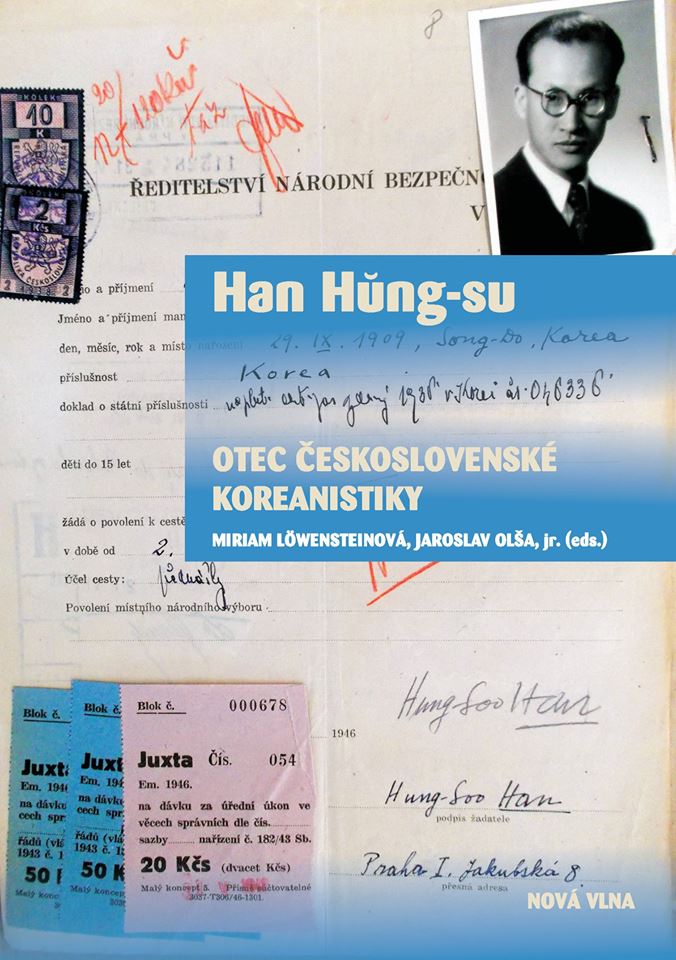Book made jointly with leading Czech Koreanist Miriam Löowensteinová covers the work and life of almost forgotten early Korean historian and later on founding father of North Korean archeology Han Hŭng-su (1909-?), who lived in Prague in 1943-48.

Abstract of the book:
“I have encountered many nations in Europe, but my Czech friends understood me the most, and so did I,” wrote Korean historian Han Hŭng-su from his home located at Prague’s picturesque Kampa in 1945. He spent twelve long years in Central Europe (1936-48), and he was personally influenced by many historic moments of that period, such as the occupation of Austria, the Nazi attack on Soviet Union, the liberation of Czechoslovakia, and the expulsion of its’ German population, as well as the division of his homeland, Korea.
Han Hŭng-su (한흥수 / 韓興洙 1909-?) first studied archaeology and ethnography at Sophia University, Tokyo (1930-36), while during his stays in Korea he organized a series of excavations of Korean dolmen sites. He thoroughly described these excavations in the contemporary Korean scholarly journals, Jindan hakpo and Pip’an. He further pursued his education in Europe in universities at Vienna (1936-38), Bern (1938-39) and Freiburg (1939-40). After employment at Vienna Ethnological Museum in 1941 he was in charge of cataloguing its Asian collections. A year later he travelled to Prague to be a guest curator of the exhibition of traditional and contemporary Japanese art held in spring 1943. Han Hŭng-su thereafter settled in Prague and spent not less than five years living there. He wrote dozens of popular and scholarly articles and – above all – a concise history of Korea entitled “Korea včera a dnes” (Korea Yesterday and Today, 1949). In the meantime, he translated a wide range of literary works by contemporary Korean writers both into Czech (Kim Nam-ch’ŏn) and into German (I Hyo-sŏk, I T’ae-jun etc.). Han Hŭng-su also translated at least one title by Czech writer Julius Fučík into Korean. While in Prague, he was also engaged in teaching Korean language courses run by Orientální ústav (The Oriental Institute) and thus gave a birth to the first generation of Czech Korean studies experts. Following the communist takeover in Czechoslovakia in 1948, Han Hŭng-su left Prague for P’yongyang after receiving a hand-written letter of invitation sent by Kim Il-sŏng. Shortly after his arrival, Han Hŭng-su was appointed Chairman of the Committee for the Preservation of Cultural Property and became the founding personality behind North Korean archaeology and museology. He also authored four early scholarly articles on archaeology published in North Korea.
Though Han Hŭng-su was, in his times, one of the best educated Korean archaeologists and specialists of prehistory, and though his works had been published in at least five languages, his life and work became soon afterwards forgotten. In North Korea his achievements were simply erased after he was purged around 1953; in South Korea, he was not talked about as a result of being the “North Korean”. Furthermore, he was even forgotten in Europe, though his life and work crossed many dividing lines in post-World War II Central Europe, as he worked on both sides of newly built Iron Curtain that divided the West and East.
This book is the very first attempt to bring him back to public knowledge and remind readers about the existence of his works that paved the background of newly established Czechoslovak Korean studies. It comprises almost all Han Hŭng-su’s works published during his stay in Prague, including his major work, “Korea Yesterday and Today”. There are two studies enclosed, an introductory piece assessing his writings from the perspective of both modern knowledge, as it was viewed by his contemporaries, written by Miram Löwensteinová; in addition, the text on Han Hŭng-su’s life, based on published and archival sources, written by Jaroslav Olša, jr. The bibliography of all works of Han Hŭng-su published in Korean, German, Czech, English and Polish is enclosed, too. There is also a list of all German-language Han Hŭng-su’s manuscripts, which were kept by his friend and close collaborator, Huberta Algermissen (Kimová) (1903-97), given into the custody of Miriam Löwensteinová in the 1980s.
Nová vlna, 1.vyd. 2014, ISBN: 9788085845365, 448 str.
